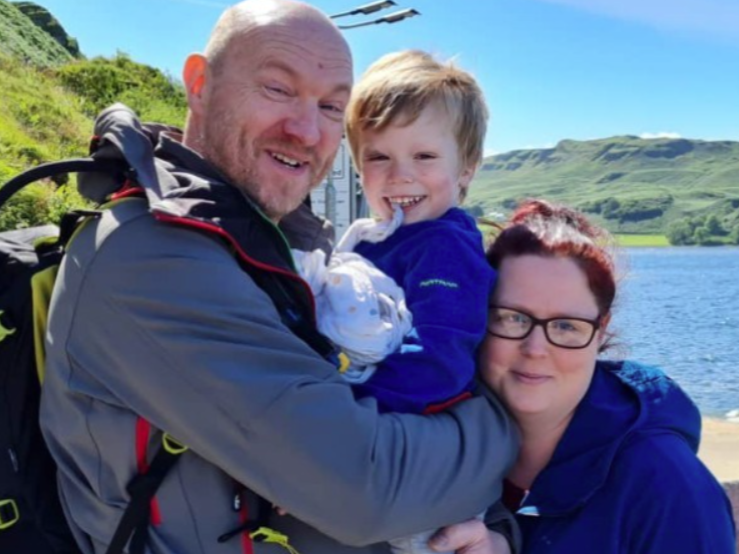Toddler diagnosed with rare form of leukaemia after mystery bruises spotted on family holiday
New Zealander Arran Cochrane, three, taken to GP on trip to Scotland

A mother whose toddler son was diagnosed with a rare form of leukaemia while on a family holiday to the UK has recounted how the condition was spotted after mystery bruises began to appear on his body.
Leighann Cochrane, 36, and husband Keith Riddell, 53, jetted back to Scotland from their home in New Zealand five weeks ago, with Arran, aged three.
The family planned to spend the break catching up with relatives and looking for a new home as they planned to move back after eight years in New Zealand.
But their lives were upturned when they began to notice mystery bruises on Arran, despite not seeing him fall over or bump into anything.
In late July, they began to notice their son was getting pin-prick bruises and that much larger ones were appearing without any indication that he was in pain while on holiday in Oban, Argyll and Bute.
Arran had also begun to complain of being too tired to walk, although he would still have bursts of energy in the playground and began looking paler than usual.
On 5 August, the couple took Arran to a GP, who referred them to a paediatrician at Forth Valley Hospital the same day and were warned it may be leukaemia.
On 6 August, medics at Glasgow Children’s Hospital confirmed Arran has acute lymphoblastic leukemia and are now selling their house in Cromwell near Queenstown, New Zealand, as they do not know what the future holds.
Ms Cochrane said her family had been “destroyed” by the diagnosis and are anticipating having to shave Arran’s head as his hair has begun to fall out due to chemotherapy.
She said the situation had not fully sunk in and that the couple were dependent on their relatives for getting them through it.
“He initially had quite a few on his legs, we thought it was just from being boisterous,” she explained.
“He is a very active child, likes to climb and jump off of everything.
“It was really the two weeks before going to the doctor that we became concerned.
“They were appearing on his stomach, cheek, his bottom for not reason.
“Then he had a huge one on his head and lower back with lumps.
“He would normally cry and we would know what and happened but they just appeared from nowhere.
“Then he started to get little pin-prick bruises.
“I knew something wasn’t right and was worried about his clotting.
“I knew leukemia was a possibility but I think I had blocked it from my head, I’d told myself there was no way it would be that.
“When the doctor said that’s what it was, I can’t describe the pain and fear.
“We were destroyed.”
Ms Cochrane, who works as a nurse, and her husband, an engineer, both resigned from their jobs as they now face the prospect of staying in the UK indefinitely and are being helped by friends in New Zealand to pack their belongings and send them over.
They are taking it in turns to stay near the hospital while the first five weeks of chemo begin while Arran is an inpatient.
That will be followed by another six months of intensive treatment and another two-and-a-half years of maintenance chemo.
Ms Cochrane, originally from Dunblane, Perthshire, added: “Some hair has started to fall out today so we will probably shave it soon.
“I think once his hair is gone he will look sicker and it’s going to hit me harder then that this is all real.”
They are fundraising £10,000 to help cover costs including bringing over Arran’s favourite books and toys, including Duplo and his Spider-Man collection, as well as clothes for the entire family.
“He has his ups and downs,” Ms Cochrane added.
“He hasn’t wanted to get out of bed for a few days but is brighter today.
“He has a very sore bottom which is distressing for all of us to change.
“We want to bring some of his favorite books and toys – he loves his Spider-Man and Paw Patrol toys.
“We barely brought anything with us as we knew we would be taking some bits back.
“We want him to have things that our familiar.
“We are overwhelmed with how amazing everyone is.”
Ms Cochrane thanked donors who gave blood and platelets that had been used in Arran’s treatment – and asked people to consider going on the bone marrow donor list.
She added: “At the moment Arran doesn’t need bone marrow, we have no idea what his future may hold.
“Hopefully the treatment works and he never will need a donor.”
To donate to the family’s Just Giving page, click here.
SWNS
Join our commenting forum
Join thought-provoking conversations, follow other Independent readers and see their replies
Comments


Bookmark popover
Removed from bookmarks